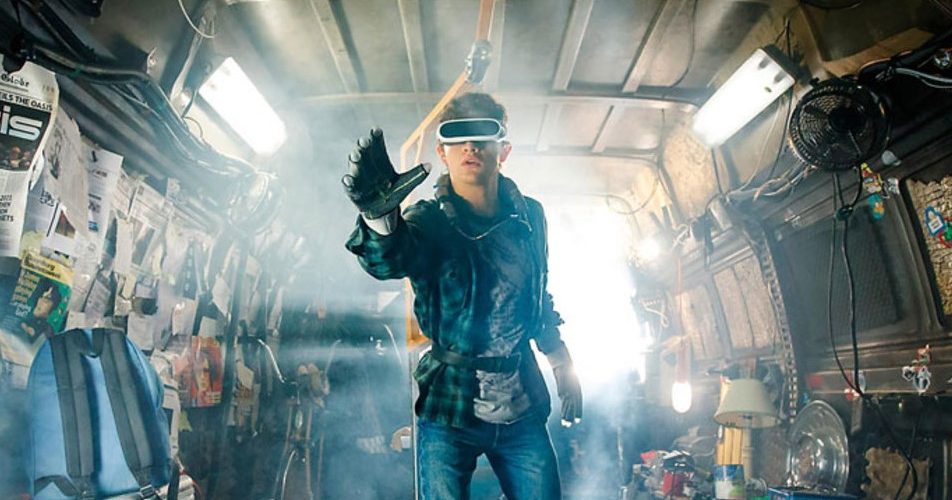Spielberg meets Oasis. Not the drink. Or the band.
If you take a look at Steven Spielberg’s directing credits, you’ll see that he hasn’t ever really taken his foot off the gas. But putting aside his classics like Jaws, E.T, Schindler’s List and Jurassic Park, his recent output has been middling and fairly forgettable. Now though, it seems like he’s found a novel to adapt which suits him perfectly.
Based on the novel of the same name by Ernest Cline, Ready Player One takes you to the year 2045, where most people are living out their lives in a limitless VR game space called Oasis, but there is still a puzzle to be solved. Left behind by the game’s creator, whoever finds the easter egg wins control of Oasis.
First of all, if you read my Tomb Raider review, you’ll know I’m not a fan of turning games into movies, but luckily this isn’t what’s happening here, this is a story based around the culture of games, not a video game story. The novel is a nostalgia stuffed story, referencing films, games and more, but I think they’ve obviously run into licensing issues as the story and the features are switched up a lot.
Tye Sheridan plays the hero, Wade Watts, an orphan living in the stacks – which is essentially a modern slum. He’s apparently, somehow, number one fan of Oasis creator James Halliday and smarter than all the scholars on the subject, giving him unique insight into solving the three puzzles left behind. No one comes out of this worse than Sheridan. I’ll come onto the whole CGI part later, but even in the scenes where he is physically there, he lacks the passion of a hero or any kind of magnetism, perhaps it’s due to the limited time we actually spend with him. As for the rest, they do a standard job of bringing an exciting story to a reasonably enjoyable place.
Mark Rylance plays James Halliday, and his scenes are given a weight which is almost separate from the main story. It’s a nice element to the film, but the attachment between Wade and Halliday is never made clear and so it’s tough to care much about either in relation to one another.
‘The scenes in the Oasis are best when chaos reigns, such as the early racing scenes or the final battle’
Because of how much of the story is spent in the Oasis, we’re seeing CGI avatars doing all the work. While the attention to digital detail is slick, the design of the characters is a little less interesting, and this is with the duller parts of the novel apparently written out. The scenes in the Oasis are best when chaos reigns, such as the early racing scenes or the final battle, but it’s mainly due to the use of recognisable characters, vehicles and vessels from other films. It doesn’t invest in these moments much though, using the majority of them to, presumably, get your interest before moving them on.
This isn’t to say that Spielberg is resting on his laurels, as you can sense his passion for this story – possibly it was the tale of the tired and beleaguered creator which drew him to it most? However, his prime was in the 80s and 90s, where the straightforward blockbuster we know now was still impressive. We’re so close to making VR an everyday gadget that this really isn’t much of a stretch. The impact of that on society takes a back seat, too, with IOI as the big bad corporation remaining fairly faceless; only Ben Mendelsohn’s presence as their leader gives them any ominous feeling.
As I pointed out earlier, Spielberg hasn’t taken much of a break, but he hasn’t had a decent action-fantasy for a while. Tintin was probably his last foray into this genre – one he helped to perfect – but even that failed to capture hearts and minds. I think that most people will enjoy this film because almost everyone has seen a Spielberg film, understands his language, and will recognise at least one reference to a film, game or franchise, but that doesn’t make this great film – it’s just ok.
I remember reading this novel when I heard Spielberg had signed up to take it on, and at the time I did wonder how he’d pull it off. I have this ongoing debate with myself about whether or not to read the book first, and I usually go with that order, but Ready Player One is one of those examples where you’ll enjoy it more if you don’t know what’s been cut or left out. While I don’t think this will be a beloved classic, I don’t think anyone could have done it better either – it’s full-on Spielberg territory, but he’s done it all better before.
